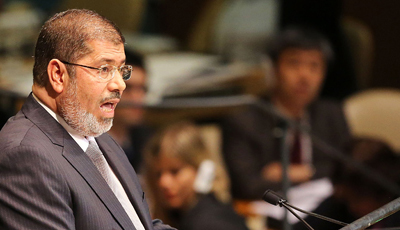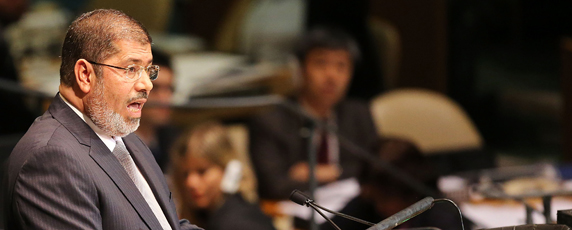The right to news and opinion is enshrined in international law. It’s not enough. By Joel Simon

Beyond Article 19, a Global Press Freedom Charter
By Joel Simon
The right to seek and receive news and express opinions is enshrined in international law, regional human rights agreements, and national constitutions the world over. The right has never been fully respected in practice, of course, and journalists have long faced imprisonment, violent attacks, and even murder in reprisal for their work.

But today, even as technology fuels a global communications revolution, a range of governments are challenging the very concept of press freedom, arguing that it is not a universal right at all but must be adapted to national circumstances. China, which has increased domestic censorship and surveillance, is leading the charge internationally. Freedom of expression groups need to raise the stakes with governments that are increasingly asserting that speech should be curtailed to accommodate culture, heritage, and threats to national security.
Consider Turkey, which CPJ has determined to be the world’s leading jailer of journalists, with 49 imprisoned in direct reprisal for their work as of December 2012. The government of Prime Minister Recep Tayyip Erdoğan says it is not cracking down on free expression. Rather, it claims to be responding to a significant threat to national security.
In a country with a history of coups and insurgencies sometimes backed by elements in the media, the government’s claims cannot be dismissed out of hand. But an October 2012 CPJ special report found that most of the detained journalists were being prosecuted under vague laws that equate covering terrorism with aiding terrorism. The evidence in many cases consists of journalism itself: published stories, phone calls to sources, and discussions with colleagues.
Nedim Şener, a leading investigative journalist, faces up 20 years in prison on charges that his critical reporting somehow furthered an anti-government plot. Şener, who already spent more than a year in jail awaiting trial, says the government is trying to persuade the public that “the normal rules of law do not apply.”
Limits on critical expression in Turkey go well beyond alleged threats to national security. Reporting seen as insulting the Turkish people or influencing court proceedings is also outlawed. And if Erdoğan had his way, insults would be off-limits as well. The prime minister told CNN’s Christiane Amanpour in a September 2012 interview that while he accepts criticism he will not tolerate insult, apparently reserving for himself the authority to distinguish between the two.
In Latin America, President Rafael Correa of Ecuador also reserves the right to personally determine the limits of acceptable criticism and claims that efforts by the human rights body of the Organization of American States to uphold international legal standards are a threat to his country’s sovereignty. In one well-documented instance, Correa brought legal action against one of Ecuador’s leading dailies, El Universo, that resulted in prison sentences for top editors and a fine of $40 million. After the verdict was upheld by the country’s Supreme Court, Correa issued a pardon, vowing he would “forgive, but not forget.”
The criminal conviction of the El Universo journalists–based solely on critical speech–was challenged by the OAS special rapporteur for freedom of expression as a violation of the American Convention on Human Rights. Correa not only lashed out at the special rapporteur and the Inter-American Commission of Human Rights (IACHR), but he also bridled at the very notion that Ecuador was bound by international legal standards.
Joining forces with a bloc of like-minded Latin American leaders, including Hugo Chávez of Venezuela and Daniel Ortega of Nicaragua, Correa won preliminary approval from OAS member states for an initiative that would greatly limit the authority and range of action of the IACHR and the special rapporteur. The rules will go into effect if approved by the General Assembly in 2013. Venezuela, meanwhile, has taken the unprecedented step of withdrawing from the American Convention on Human Rights, a largely symbolic but highly charged gesture.
“Chávez sees the American Convention on Human Rights as an obstacle for his vision of Venezuelan society,” said Claudio Grossman, dean of the American University College of Law and a former president of the IACHR. Grossman acknowledged the significant threat posed by Correa, Chávez, and others to the regional human rights system that has safeguarded freedom of expression throughout the Americas, but concluded, “I don’t believe they will carry the day.”
Threats to the international legal system that protects freedom of expression are emerging from many quarters. Leaders in the Islamic world have long asserted the right to restrict expression that offends religious sensibilities and have advocated within the United Nations for various resolutions condemning defamation of religion–an effort that, if successful, could make blasphemy an international crime. The debate over the limits of free speech and religion reached the floor of the U.N. General Assembly in September 2012 in the aftermath of the provocative video “The Innocence of Muslims” that mocked the Prophet Muhammad.
Speaking at the United Nations, U.S. President Barack Obama argued that freedom of expression is not an American or Western value, but a universal ideal. Obama said that “at a time when anyone with a cellphone can spread offensive views around the world with the click of a button, the notion that we can control the flow of information is obsolete.” Egyptian President Mohamed Morsi pushed back, arguing that it was unacceptable for U.S. freedom of expression standards to be imposed through the Internet on the entire world and asserting that Egypt had no obligation to tolerate speech that incites hatred, deepens ignorance, or disregards others. Morsi’s position was endorsed by many other governments, particularly those from the Muslim world.
The Chinese also view the global nature of the Internet as a threat–although their focus is on national security and stability–and say the United Nations should intervene. The Chinese vision is that the Internet should operate a bit like a national highway system that is part of the global network but subject to the specific laws and mores of each country. They have used a variety of means to realize this vision inside their borders: filtering foreign content (including recent exposés from international media outlets on the personal wealth of Chinese leaders) while censoring, intimidating, and prosecuting domestic critics.
China’s job would be much easier if there were a centralized system of Internet administration beholden to the interest not of individual users but of sovereign states, inverting the current paradigm. Beijing’s proposal for a U.N.-administered Internet is supported by many other nations, including Iran, which is trying to use Chinese technology to produce what it calls a “halal” or authorized domestic Web free of subversive political speech and religious criticism.
China does not reject outright international standards of freedom of expression, says Sharon Hom, executive director of the advocacy group Human Rights in China. Instead, it asserts that such standards must be adapted to “national circumstances” and that in China’s case, restrictions are justified because of national security concerns. In the international arena, China shrewdly exploits Western concerns about the threat posed by cyberattacks and cybercrime, while building support for a global system of Internet control in the developing world by casting the Web as an essential piece of global infrastructure dominated by “U.S. hegemonic interests.”
Hom argues that if Western democracies fail to confront China, Beijing’s ability to build a global coalition that supports–or at least tolerates–Internet control and monitoring will be immeasurably strengthened. Democracies “cannot allow themselves to be held hostage to their fears,” she said. “You can’t allow the debate over the Internet to be captured by statist rhetoric.”
Article 19 of the Universal Declaration of Human Rights adopted in 1948 states simply that “Everyone has the right to freedom of opinion and expression; this right includes freedom to hold opinions without interference and to seek, receive, and impart information and ideas through any media and regardless of frontiers.” The International Covenant on Civil and Political Rights, a multilateral treaty adopted by the U.N. General Assembly in 1966, broadly reaffirmed this language but also outlined permissible restrictions to protect the rights and reputations of others, national security, and public health, so long as such restrictions are codified in law.
“That little phrase, ‘regardless of frontiers,’ is extraordinary even in the world of human rights agreements,” points out Timothy Garton Ash, a professor at Oxford University and an expert on modern European history who is writing a book on global free expression. “Most human rights agreements are obligations and demands put on states regarding the way they treat their own citizens.”
The transnational nature of the right to freedom of expression is echoed in regional human rights treaties such as the American Convention on Human Rights, whose Article 13 contains an explicit prohibition on prior censorship within the Americas. Though the nature of permissible restrictions has been a source of discussion and debate, regional human rights bodies such as the European Court of Human Rights and the IACHR have a strong record on freedom of expression issues. But with the legal principles that undergird press freedom under attack from many governments around the world, the risk that basic standards could be rolled back is real and increasing.
The key challenge is that the Internet and other modern communication technologies have made real the once-abstract ideal expressed in Article 19: that the right to freedom of expression transcends borders.
“Freedom of expression was extended with the spread of democracy in the latter half of the 20th century,” noted Ash, who helped establish the website Freespeechdebate.com, which hosts a global discussion on freedom of expression in the digital age. “Today we have an emerging superpower, China, which has a 19th-century norm regarding state power. For many countries this view is attractive. They are very interested in China’s example. Post-colonial countries across the board are able to say, ‘Yes, you do have to pay regard to our frontier.'”
The Internet disrupts in two ways. First, it makes it difficult to control ideas, information, and images entering a country from outside. Some of the material available to Internet users around the world–from pornography to anti-religious screeds to exposés on human rights violations and corruption–are shocking or even destabilizing in countries that have long controlled the flow of information. Second, technology makes it easier to share news and information domestically and for political movements to build communities of opposition. The Arab Spring is the most striking example, but the Internet has proven a disruptive political force in countries from Iran to Vietnam. Governments in many places are seeking to control the Internet itself while simultaneously cracking down on individual online dissenters, including journalists.
But a 2011 report from the U.N. special rapporteur for freedom of expression, Frank LaRue, determined that the specific language of Article 19 anticipated the development of new information technologies. Thus, the same principles of international law that have long applied to the traditional media also apply to all Internet users the world over.
And while international law permits certain restrictions on the basis of threats to national security, there is no legal basis for the broad and sweeping restrictions imposed by countries like Turkey in the name of fighting terrorism. In 1985, a group of legal scholars developed the Johannesburg Principles on national security and freedom of expression. They declare: “No restriction on freedom of expression or information on the ground of national security may be imposed unless the government can demonstrate that the restriction is prescribed by law and is necessary in a democratic society to protect a legitimate national security interest. The burden of demonstrating the validity of the restriction rests with the government.”
International law also does not permit restrictions on the expression of ideas that offend or shock religious beliefs, although advocacy for “national, racial, or religious hatred that constitutes incitement to discrimination, hostility, or violence” can be banned. But efforts to define what constitutes hate speech in an international context have been challenging, and governments have abused the concept to justify restrictions on legitimate and lawful criticism. Many African governments, for example, have argued that unfettered “Western”-style press freedom accentuates ethnic divisions. In Rwanda, where the role of local radio stations in fueling the 1994 genocide has been well documented, critical journalists are regularly prosecuted under laws criminalizing “incitement to tribal hatred” and “divisionism” and jailed or forced into exile.
Morsi and other leaders in the Islamic world have essentially made the same argument–that the global nature of the Internet imposes Western standards of free expression on nations that don’t want to see their deeply held religious beliefs mocked and denigrated. Morsi has a point, but the converse is also true: Restrictions on freedom of expression imposed in the name of religion in Egypt, Pakistan, or Iran represent a form of global censorship that deprive the world of relevant and timely information that would otherwise be available online to international decision makers and global citizens.
The basic consensus supporting freedom of expression in international law is strong enough to push back firmly against autocratic leaders who seek legal and political cover for their restrictive policies. Simply put, there is no basis in international law for distinguishing between criticism and insult as Turkey’s Erdoğan suggests; no basis for restricting speech that “deepens ignorance” or “disregards others” as Morsi proposes to do; and no basis for the broad restrictions on Internet content that China seeks. The criminal defamation lawsuits that Ecuador’s Correa has used to bludgeon his media critics violate basic principles enumerated in Inter-American law. Correa’s petulant attacks on the IACHR for upholding these rights are unwarranted and dangerous.
International law and jurisprudence are critical to the realization of the ideals expressed in Article 19, but so is political action. Defenders of freedom of expression must unite behind a clear, concise, and accessible statement of what the exercise of those ideals means in practice. What is needed is a global freedom of expression charter.
Precisely what should be included in a charter needs to be determined by civil society groups in consultation with legal experts. Certainly, government perspectives on issues like national security should be considered, and to the extent possible dialogue between national freedom of expression organizations and government officials needs to be encouraged. But there can be no compromise when it comes to the ideals enumerated in Article 19–ideals that unite people all over the world who are struggling to express themselves or access independent information.
Though there are various statements, principles, and declarations on freedom of expression and Internet freedom, many are technical, legal, regional, or narrow in scope. What is needed is a new document that does not merely restate principles that are long established in international law, but translates those principles into concrete and verifiable terms.
At a minimum, a global freedom of expression charter should make clear that prior censorship, government control over the Internet, criminal defamation statutes, criminal blasphemy laws, and libel suits brought by high officials are incompatible with Article 19 guarantees. Threats or violent acts carried out by governments to curb the expression of criticism or ideas are always unacceptable and must be condemned. In fact, governments have an obligation to investigate crimes against freedom of expression, including attacks on journalists.
The charter should be formally endorsed by the global freedom of expression community, and individual governments should be pressured to declare their public commitment to its principles. Some leaders will readily embrace it; others can be compelled to do so; and many others will resist. The idea is to eventually build broad enough support that governments refusing to endorse the charter will be perceived as outliers. Governments that commit to the principles, meanwhile, should also agree to undergo a periodic independent assessment to evaluate compliance.
The growing attacks from intolerant leaders on the universality of the ideals enumerated in Article 19 of the Universal Declaration threaten not only critical journalists but also people everywhere who are using new technologies to express their ideas and stay informed. A consensus forged by civil society and converted into clear, attainable, and verifiable standards will not only support the work of the media but also help people everywhere realize the full potential of the information revolution.
Joel Simon is executive director of the Committee to Protect Journalists. He led a CPJ mission to Turkey in 2011.

